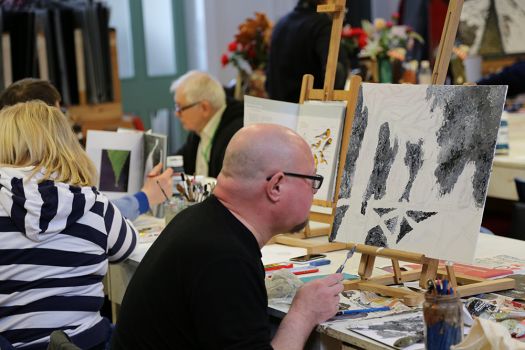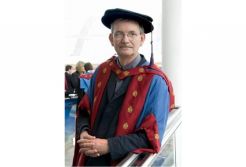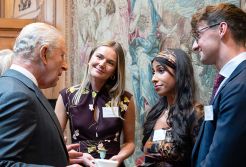Arts for Health features in national campaign
16 May 2019
New MadeAtUni campaign features health and wellbeing projects
Find out more about #MadeAtUni and #MadeAtMcrMet
Manchester Metropolitan University’s Arts for Health programme is featured in today’s launch of the second phase of Universities UK’s MadeAtUni campaign.
Entitled Nation’s Lifesavers, the campaign highlights work within universities across the country which is saving lives or making a life-changing difference to our health and wellbeing.
The list of 100 case studies was compiled by Universities UK, the umbrella group for UK universities, as part of the MadeAtUni campaign to change public perceptions of universities and bring to life the difference they make to people, lives and communities across the UK.
It follows independent research undertaken by Britain Thinks which found that the public has little understanding of the benefits of universities beyond undergraduate teaching. The findings show that research is one of the key triggers to change opinion about universities but for many people, it is an abstract concept.
‘Sanctuary’
For more than 30 years, Arts for Health at Manchester Metropolitan University has been leading the way in demonstrating how participating in the arts can improve health and wellbeing. Led by Dr Clive Parkinson, the project has demonstrated how creativity, culture and the arts can reduce depression, anxiety and stress and can even help with managing dementia, addiction, loneliness and social isolation.
Partnerships, including those with local charities, have shown that enabling recovery from illness through engagement in the arts and culture can promote longer, more enriched lives.
One participant said: “It’s the best thing that ever happened to me. The arts give you that mindfulness, where you’re engaged in your work and nothing really matters…It’s like a sanctuary against the ravages of depression and anxiety.”
At the recent World Health Healthcare Congress held in Manchester, Dr Parkinson launched the Manchester Declaration, a vision statement for how Greater Manchester becomes a “city region where arts and culture are seen as central to the wellbeing of its diverse residents and workforce, a global leader exemplifying the very best in arts, health and social change.”
Health impact
Dr Parkinson said: “We are beginning to better understand some of the factors that underpin people’s health across the life course. Culture and the arts have a very real part to play in assets-based healthcare. The Manchester Declaration offers us a collective voice to really begin to understand the impact and reach of the arts in everyone’s lives.”
Professor Dame Janet Beer, President of Universities UK, said: “When people think of lifesavers they understandably tend to focus on the dedication and skill of our doctors, nurses, carers, and paramedics – many of whom are trained at universities. Every day, up and down the country, universities are also working on innovations to transform and save lives. Research taking place in universities is finding solutions to so many of the health and wellbeing issues we care about and the causes that matter.
“By proudly working in partnership with charities, the NHS and healthcare organisations, universities are responsible for some of our biggest health breakthroughs and in revolutionising the delivery of care.
“This campaign is a chance to bring to life the wonderful and often unexpected work going on every day in our universities and to celebrate some of the people working to make a life-changing difference to us all.”
To find out more about Arts for Health and the impact it makes you can read the following article which featured in issue 4 of Met Magazine.
More information on the MadeAtUni campaign can be found on the dedicated campaign website www.madeatuni.org.uk.



